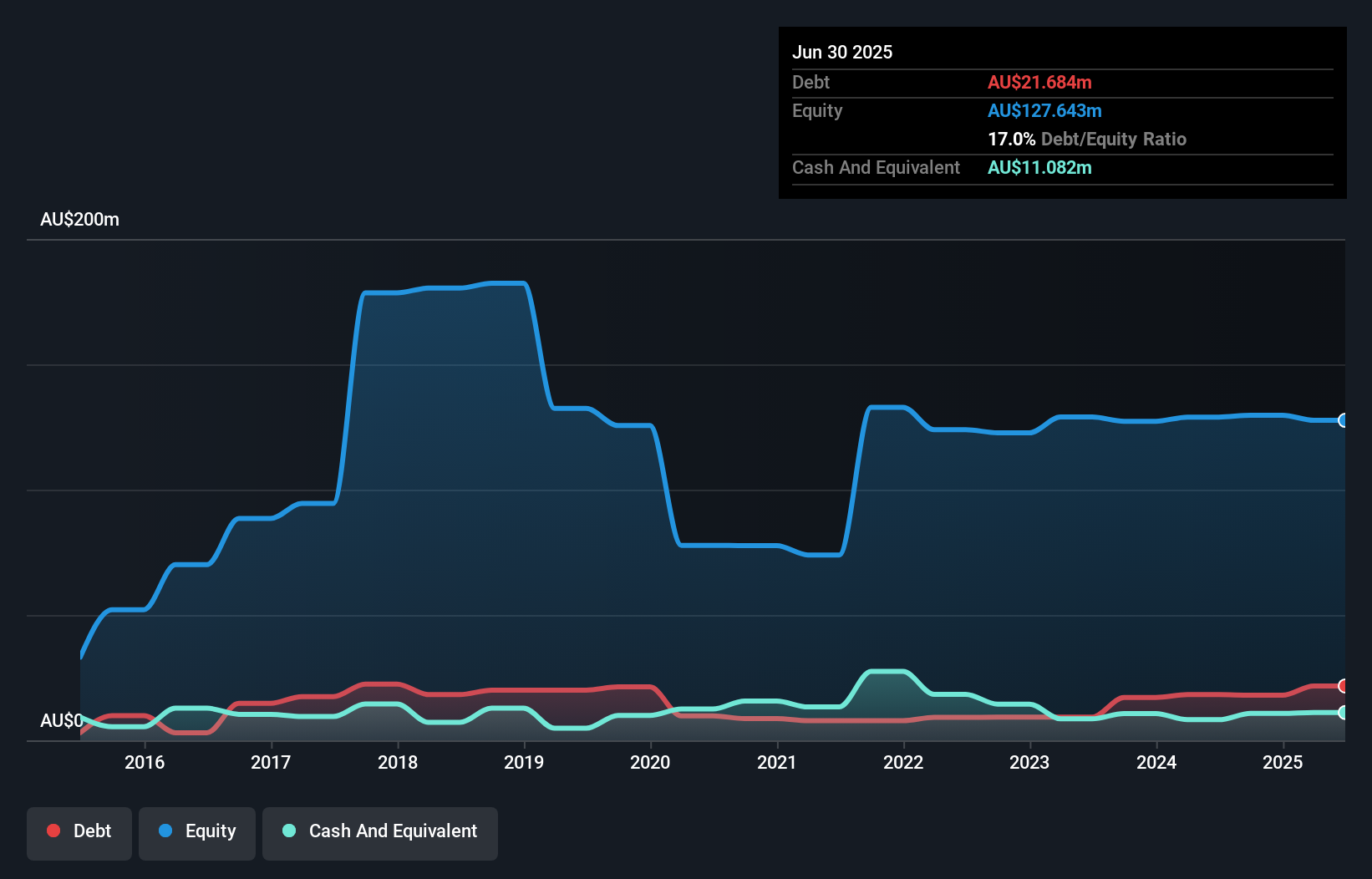Warren Buffett famously said, 'Volatility is far from synonymous with risk.' When we think about how risky a company is, we always like to look at its use of debt, since debt overload can lead to ruin. We can see that Experience Co Limited (ASX:EXP) does use debt in its business. But should shareholders be worried about its use of debt?
What Risk Does Debt Bring?
Debt assists a business until the business has trouble paying it off, either with new capital or with free cash flow. If things get really bad, the lenders can take control of the business. However, a more common (but still painful) scenario is that it has to raise new equity capital at a low price, thus permanently diluting shareholders. Of course, plenty of companies use debt to fund growth, without any negative consequences. The first step when considering a company's debt levels is to consider its cash and debt together.
What Is Experience Co's Debt?
You can click the graphic below for the historical numbers, but it shows that as of June 2025 Experience Co had AU$21.7m of debt, an increase on AU$18.2m, over one year. However, because it has a cash reserve of AU$11.1m, its net debt is less, at about AU$10.6m.

How Strong Is Experience Co's Balance Sheet?
Zooming in on the latest balance sheet data, we can see that Experience Co had liabilities of AU$31.5m due within 12 months and liabilities of AU$31.4m due beyond that. On the other hand, it had cash of AU$11.1m and AU$3.08m worth of receivables due within a year. So its liabilities total AU$48.7m more than the combination of its cash and short-term receivables.
Experience Co has a market capitalization of AU$90.7m, so it could very likely raise cash to ameliorate its balance sheet, if the need arose. But we definitely want to keep our eyes open to indications that its debt is bringing too much risk.
Check out our latest analysis for Experience Co
We measure a company's debt load relative to its earnings power by looking at its net debt divided by its earnings before interest, tax, depreciation, and amortization (EBITDA) and by calculating how easily its earnings before interest and tax (EBIT) cover its interest expense (interest cover). This way, we consider both the absolute quantum of the debt, as well as the interest rates paid on it.
Experience Co has a very low debt to EBITDA ratio of 0.81 so it is strange to see weak interest coverage, with last year's EBIT being only 1.7 times the interest expense. So one way or the other, it's clear the debt levels are not trivial. We also note that Experience Co improved its EBIT from a last year's loss to a positive AU$3.9m. The balance sheet is clearly the area to focus on when you are analysing debt. But it is future earnings, more than anything, that will determine Experience Co's ability to maintain a healthy balance sheet going forward. So if you want to see what the professionals think, you might find this free report on analyst profit forecasts to be interesting.
Finally, while the tax-man may adore accounting profits, lenders only accept cold hard cash. So it is important to check how much of its earnings before interest and tax (EBIT) converts to actual free cash flow. During the last year, Experience Co generated free cash flow amounting to a very robust 85% of its EBIT, more than we'd expect. That puts it in a very strong position to pay down debt.
Our View
On our analysis Experience Co's conversion of EBIT to free cash flow should signal that it won't have too much trouble with its debt. However, our other observations weren't so heartening. In particular, interest cover gives us cold feet. When we consider all the factors mentioned above, we do feel a bit cautious about Experience Co's use of debt. While debt does have its upside in higher potential returns, we think shareholders should definitely consider how debt levels might make the stock more risky. There's no doubt that we learn most about debt from the balance sheet. But ultimately, every company can contain risks that exist outside of the balance sheet. For instance, we've identified 1 warning sign for Experience Co that you should be aware of.
If, after all that, you're more interested in a fast growing company with a rock-solid balance sheet, then check out our list of net cash growth stocks without delay.
Valuation is complex, but we're here to simplify it.
Discover if Experience Co might be undervalued or overvalued with our detailed analysis, featuring fair value estimates, potential risks, dividends, insider trades, and its financial condition.
Access Free AnalysisHave feedback on this article? Concerned about the content? Get in touch with us directly. Alternatively, email editorial-team (at) simplywallst.com.
This article by Simply Wall St is general in nature. We provide commentary based on historical data and analyst forecasts only using an unbiased methodology and our articles are not intended to be financial advice. It does not constitute a recommendation to buy or sell any stock, and does not take account of your objectives, or your financial situation. We aim to bring you long-term focused analysis driven by fundamental data. Note that our analysis may not factor in the latest price-sensitive company announcements or qualitative material. Simply Wall St has no position in any stocks mentioned.
About ASX:EXP
Experience Co
Engages in the adventure tourism and leisure business in Australia and New Zealand.
Undervalued with reasonable growth potential.
Market Insights
Community Narratives



